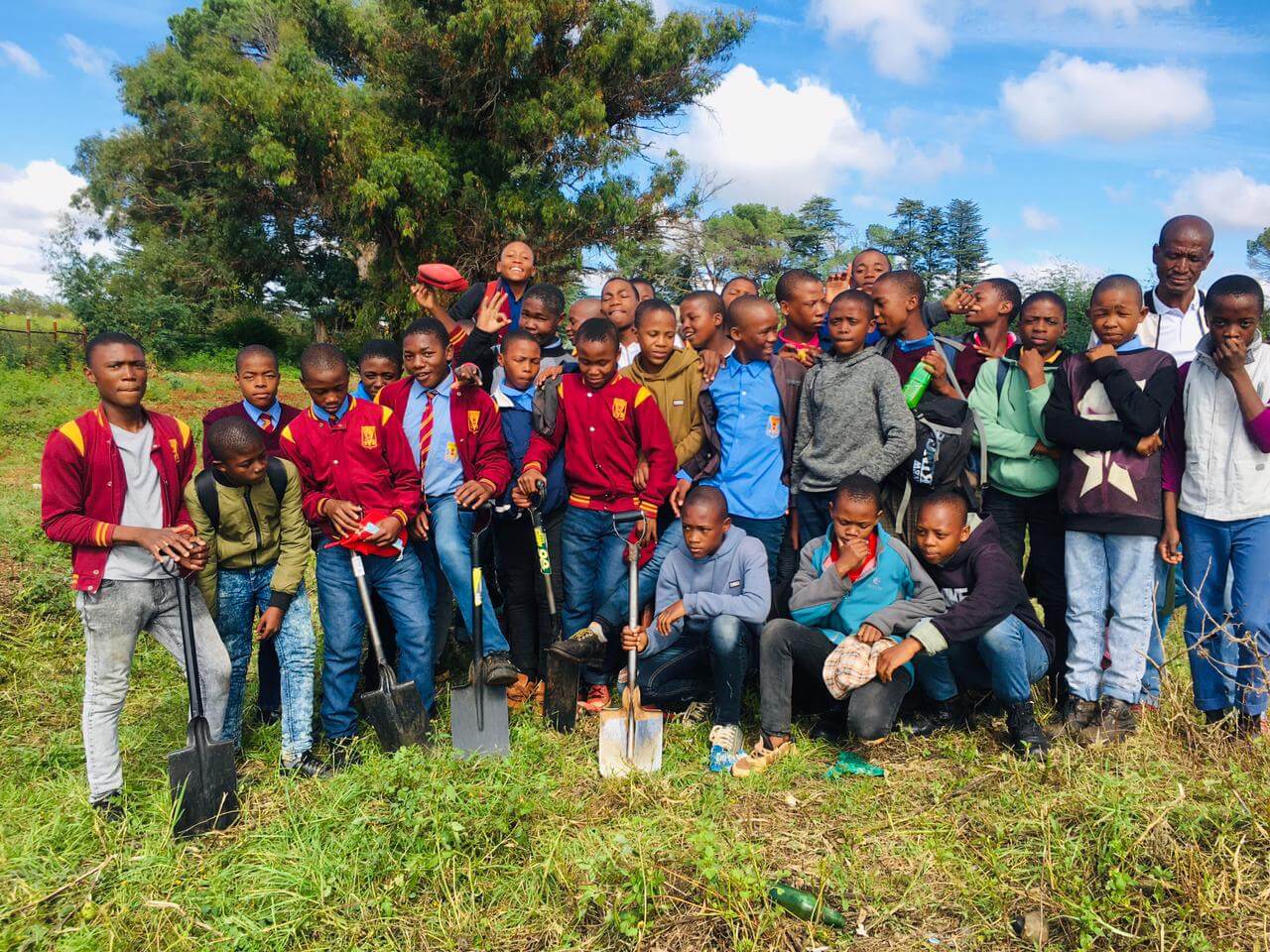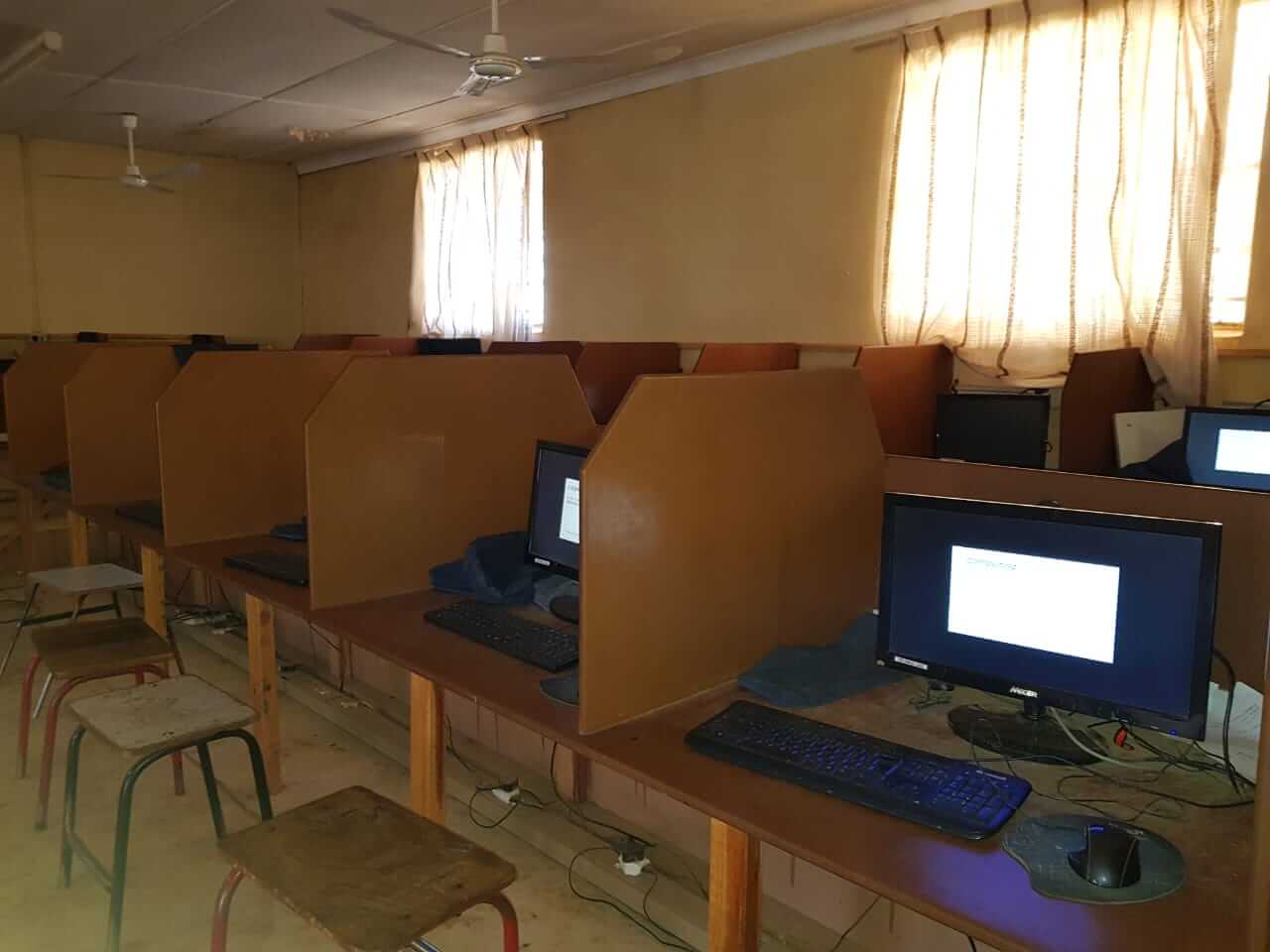Curriculum
Our Curriculum Overview
A Commitment to Excellence
Sacred Heart Commercial High School aims at offering all our students a broad and balanced curriculum that provides rewarding and stimulating activities to prepare them for the best social and cultural life.
Whether it is our books or hands-on training, we make sure each student gets personal attention to cope and flourish in every subject for better scores and a brighter future, while aligning with the Lesotho General Certificate of Secondary Education (LGCSE) Curriculum.
English
English is a crucial subject for high school students as it lays the foundation for effective communication, critical thinking, and analysis skills. In this subject, students learn to read, write, speak, and listen effectively, enhancing their ability to express themselves confidently and clearly. . Additionally, English classes help students improve their vocabulary, grammar, and syntax, enabling them to communicate effectively in both written and spoken forms. Mastery of the English language is essential for success in any profession, and the subject prepares students for college and career opportunities. Thus, English is a vital subject as it provides students with the skills and tools necessary for personal and professional growth.
Sesotho
Sesotho is the native language in Lesotho that most of our learners have grown up speaking from their early childhood. Native language refers to the language that a person learns as their first language during childhood and continues to use as their primary means of communication. In this curriculum, the study of our native language involves developing proficiency in reading, writing, speaking, and listening in the language. The course covers topics such as grammar, vocabulary, literature, and communication skills. Through studying their native language, students develop a deeper understanding and appreciation of their culture and heritage, as well as the ability to communicate effectively with others in the language. Additionally, the study of Sesotho provides a foundation for learning other languages and for developing cross-cultural communication skills. Native language is relevant to many aspects of daily life, including personal communication, education, and career opportunities.
Mathematics
Mathematics is a fundamental subject that is essential for high school students to learn. It involves the study of numbers, shapes, patterns, and relationships between them, and it teaches students how to use logic and reasoning to solve problems. Math is a crucial subject because it is used in many real-life situations, from calculating taxes to analyzing data, designing buildings, and making financial decisions. The study of mathematics helps students develop critical thinking skills, as they learn how to analyze problems, identify patterns, and develop logical arguments. The subject also teaches students how to communicate their reasoning effectively and clearly, both in writing and verbally. This skill is particularly important in today's world, where data analysis and mathematical modeling are increasingly used in many fields, including science, engineering, finance, and economics.

Chemistry
Chemistry is the branch of science that deals with the composition, structure, and properties of matter, as well as the changes it undergoes during chemical reactions. In this curriculum, chemistry is a foundational science course that focuses on introducing students to the fundamental concepts and principles of chemistry, such as atomic structure, chemical bonding, reactions, and the periodic table. Through hands-on laboratory experiments and classroom lectures, students will develop critical thinking and problem-solving skills, as well as an understanding of the role of chemistry in our daily lives and in the world around us.
Physics
Physics is the scientific study of matter and energy and their interactions with each other in the universe. In this curriculum, physics introduces students to the basic principles of physics, including motion, energy, forces, waves, and electromagnetism. The course involves conducting experiments, analyzing data, and making predictions based on observations and mathematical models. Through physics, students develop critical thinking skills and learn to use scientific methods to investigate natural phenomena. Additionally, physics helps students understand the world around them, from the behavior of everyday objects to the workings of complex systems, such as machines, electricity, and the universe.
Biology
Biology is the scientific study of living organisms and their interactions with their environment. In this curriculum, biology provides a foundational understanding of life processes and the diversity of living organisms. The course covers topics such as cell biology, genetics, evolution, etc. Through laboratory experiments and classroom lectures, students develop an understanding of the scientific methods, critical thinking skills, and an appreciation for the complexity and interconnectedness of living systems. Biology is relevant to everyday life and helps students understand the impact of human activity on the natural world. Furthermore, biology provides a basis for understanding health and medicine, as well as the potential for scientific advancements in biotechnology and environmental conservation.
English Literature
English literature is the study of literary works written in the English language, from different time periods and cultures. In this curriculum, English literature aims to develop students' critical reading and analytical skills, as well as their ability to communicate effectively in written and spoken forms. The course covers a range of genres, including poetry, drama, and prose, and focuses on analyzing literary techniques and devices, themes, and historical and cultural contexts. Students also learn to analyze and interpret the meanings and significance of literary works, and to appreciate the value of literature as a reflection of human experiences and perspectives. Through studying English literature, students can develop a deeper understanding of the world around them and gain insights into the human condition.
Religious Studies
As a Christian educational institution in Lesotho, Religious studies is a very important subject to us. It encompasses the study of the beliefs, practices, and history of the Christian faith. In this high school curriculum, religious studies aims to provide students with an understanding of the central tenets of Christianity, as well as the diversity of Christian traditions and practices. The course covers topics such as the life and teachings of Jesus, the history of Christianity, the Bible, Christian ethics and morality, and the role of religion in society. Through studying religious studies, students can develop an appreciation for the cultural and historical significance of Christianity, as well as an understanding of the ways in which religion influences human behavior and societal values. Additionally, religious studies can help students develop their critical thinking skills and gain a deeper understanding of their own beliefs and values.
Economics
Economics is the social science that studies how people allocate resources to satisfy their wants and needs. In this curriculum, economics aims to introduce students to the basic concepts and principles of economics, such as supply and demand, market structures, and the role of government in the economy. The course also covers topics such as international trade, economic growth, inflation, and unemployment. Through studying economics, students can develop an understanding of how markets work, how businesses make decisions, and how individuals make choices in a world of scarce resources. Additionally, economics can help students understand the impact of economic policies on society and the role of government in regulating economic activity. Economics is relevant to many aspects of daily life, such as personal finance, consumer behavior, and public policy, and can provide a foundation for further study in business, finance, and public policy.
Business Studies
Business studies is the study of the principles and practices of business management and entrepreneurship. In this curriculum, business studies aims to introduce students to the basic concepts and principles of business, such as marketing, finance, accounting, human resources, and operations management. The course covers topics such as business ethics, globalization, entrepreneurship, and the role of government in regulating business activity. Through studying business studies, students develop skills in critical thinking, problem-solving, decision-making, and communication. Additionally, business studies provides a foundation for understanding the complex nature of business and its impact on society, including economic growth, job creation, and innovation. Business studies is relevant to many aspects of daily life, such as personal finance, consumer behavior, and entrepreneurship, and can provide a pathway for students interested in pursuing careers in business, management, or entrepreneurship.
Accounting
Accounting is the process of recording, classifying, and summarizing financial transactions to provide information that is useful for decision-making purposes. In this curriculum, accounting aims to introduce students to the basic concepts and principles of financial accounting, such as the accounting equation, financial statements, and the role of accounting in business. The course covers topics such as balance sheets, income statements, cash flow statements, and the principles of accounting. Through studying accounting, students develop skills in financial analysis, record keeping, and financial reporting. Additionally, accounting provides a foundation for understanding the financial aspects of personal and business decision-making, such as budgeting, investing, and financial planning. Accounting is relevant to many aspects of daily life, such as personal finance and entrepreneurship, and can provide a pathway for students interested in pursuing careers in accounting, finance, or business management.

Agriculture
Agriculture is the science and practice of cultivating soil, growing crops, and raising livestock for human use and consumption. In this curriculum, agriculture aims to introduce students to the basic concepts and principles of agricultural science, such as plant and animal biology, soil science, and food production. The course covers topics such as agricultural economics, agricultural policy, sustainable agriculture, and the impact of agriculture on the environment. Through hands-on experiences, students develop skills in plant and animal care, agricultural technology, and farm management. Additionally, agriculture provides a foundation for understanding the role of agriculture in society, including food security, rural development, and the global economy. Agriculture is relevant to many aspects of daily life, such as food production, nutrition, and environmental sustainability, and can provide a pathway for students interested in pursuing careers in agriculture, food science, or environmental science

Information, Communication and Technology (ICT)
Information, communication, and technology (ICT) refers to the use of technology to create, process, store, and exchange information. In this curriculum, ICT aims to introduce students to the basic concepts and principles of technology, such as hardware, software, networks, and the internet. Through hands-on experiences, students develop skills in using a range of software and hardware tools, as well as in problem-solving, critical thinking, and communication. Additionally, ICT provides a foundation for understanding the role of technology in society, including the impact of technology on the economy, culture, and the environment. ICT is relevant to many aspects of daily life, such as communication, entertainment, and education, and can provide a pathway for students interested in pursuing careers in technology, engineering, or computer science.
Design and Technology
Design and technology is a subject that involves the use of materials and technology to create products that solve problems or meet human needs. In a high school curriculum, design and technology aims to introduce students to the basic concepts and principles of design, such as form, function, and aesthetics, as well as the use of materials such as wood and metal to create products. The course covers topics such as design thinking, technical drawing, materials and manufacturing processes, and sustainability. Through hands-on experiences, students develop skills in using a range of hand and power tools, as well as in problem-solving, critical thinking, and creativity. Additionally, design and technology provides a foundation for understanding the role of design in society, including the impact of design on the environment, culture, and human behavior. Design and technology is relevant to many aspects of daily life, such as home repair, DIY (do-it-yourself) projects, and creative pursuits, and can provide a pathway for students interested in pursuing careers in engineering, architecture, or industrial design.
